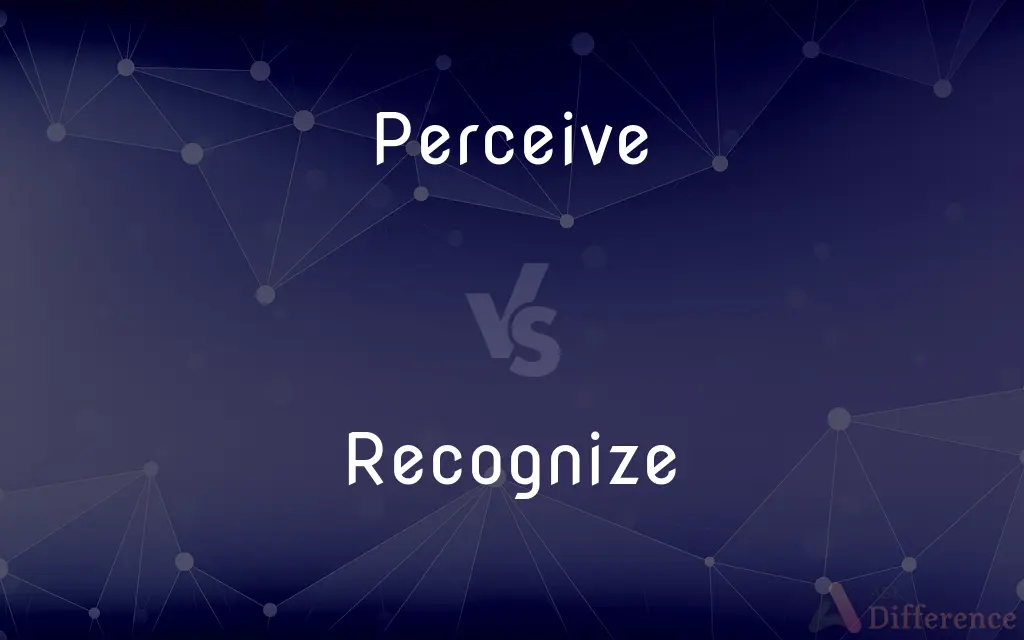Perceive vs. Recognize — What's the Difference?
By Urooj Arif & Maham Liaqat — Updated on April 3, 2024
Perception involves the sensory interpretation of stimuli, while recognition refers to the identification of something as familiar.

Difference Between Perceive and Recognize
Table of Contents
ADVERTISEMENT
Key Differences
Perception is the process through which sensory information is interpreted by the brain, allowing individuals to understand their environment. It encompasses all sensory inputs, such as sight, sound, touch, taste, and smell. Recognition, however, specifically involves identifying something previously experienced, linking current perceptions to memory.
While perception is a broader term that includes the initial stages of sensory processing, recognition is a more specific cognitive process that requires comparing sensory input with previously stored information. For example, one may perceive a pattern of colors and shapes (perception) and then realize it is a friend's face (recognition).
Perception can occur without recognition, especially in cases where something is sensed for the first time or is not remembered. On the other hand, recognition cannot occur without prior perception, as it relies on the interpretation of sensory information that has been previously encoded into memory.
Recognition often involves a sense of familiarity and connection to previous experiences, while perception is the primary mechanism through which we experience the world around us, regardless of familiarity. For instance, one might perceive a new song (hearing the melody and lyrics) but recognize an old favorite when it plays (identifying it as known and familiar).
The distinction between perceiving and recognizing is also important in various fields, such as psychology, where understanding how individuals interpret stimuli and identify familiar elements can have implications for memory studies, learning processes, and even in diagnosing and treating perceptual or cognitive disorders.
ADVERTISEMENT
Comparison Chart
Definition
Interpretation of sensory information.
Identification of something as familiar.
Process
Sensory input to interpretation.
Comparison of sensory input with memory.
Requirement
Sensory data.
Previous knowledge or experience.
Cognitive Step
Initial processing of stimuli.
Advanced processing involving memory.
Independence
Can occur without recognition.
Requires prior perception.
Compare with Definitions
Perceive
Can vary greatly among individuals.
Different people can perceive the same artwork in varied ways.
Recognize
Relies on linking stimuli with past experiences.
You recognize a friend's voice because you've heard it before.
Perceive
Encompasses the initial interaction with the environment.
Babies perceive the world around them through basic sensory experiences.
Recognize
Involves acknowledging something as known.
Recognizing a song's melody as one you've heard in the past.
Perceive
Essential for all higher cognitive processes.
Perception allows us to navigate and understand our surroundings.
Recognize
Requires prior exposure or knowledge.
Learning a language enables you to recognize words and phrases.
Perceive
Does not require previous knowledge to occur.
One can perceive a new scent without having to recognize it.
Recognize
Builds on basic perception for deeper understanding.
Recognition allows us to place sensory inputs into context.
Perceive
Involves understanding stimuli through senses.
We perceive colors through the visual processing of light.
Recognize
Engages memory to identify and classify stimuli.
Recognizing landmarks helps in navigating familiar places.
Perceive
Become aware or conscious of (something); come to realize or understand
He was quick to perceive that there was little future in such arguments
His mouth fell open as he perceived the truth
Recognize
To know to be something that has been perceived before
Recognize a face.
Perceive
Interpret or regard (someone or something) in a particular way
If Guy does not perceive himself as disabled, nobody else should
Some geographers perceive hydrology to be a separate field of scientific enquiry
Recognize
To know or identify from past experience or knowledge
Recognize hostility.
Perceive
To become aware of (something) directly through any of the senses, especially sight or hearing
We could perceive three figures in the fog.
Recognize
To perceive or show acceptance of the validity or reality of
Recognizes the concerns of the tenants.
Perceive
To cause or allow the mind to become aware of (a stimulus)
The ear perceives sounds.
Recognize
To permit to address a meeting
The club's president recognized the new member.
Perceive
To achieve understanding of; apprehend
Einstein perceived that energy and matter are equivalent. ].
Recognize
To accept officially the national status of as a new government.
Perceive
(transitive) To become aware of, through the physical senses, to see; to understand.
Recognize
To show awareness of; approve of or appreciate
Recognize services rendered.
Perceive
To interpret something in a particular way
John was perceived to be a coward by his comrades
Recognize
To admit the acquaintance of, as by salutation
Recognize an old friend with a cheerful greeting.
Perceive
To obtain knowledge of through the senses; to receive impressions from by means of the bodily organs; to take cognizance of the existence, character, or identity of, by means of the senses; to see, hear, or feel; as, to perceive a distant ship; to perceive a discord.
Recognize
(Law) To enter into a recognizance.
Perceive
To take intellectual cognizance of; to apprehend by the mind; to be convinced of by direct intuition; to note; to remark; to discern; to see; to understand.
Jesus perceived their wickedness.
You may, fair lady,Perceive I speak sincerely.
Till we ourselves see it with our own eyes, and perceive it by our own understandings, we are still in the dark.
Recognize
(Biology) To exhibit recognition for (an antigen or a substrate, for example).
Perceive
To be affected of influented by.
The upper regions of the air perceive the collection of the matter of tempests before the air here below.
Recognize
(transitive) To match (something or someone which one currently perceives) to a memory of some previous encounter with the same person or thing.
I recognised his face immediately, although his voice was different.
Perceive
To become aware of through the senses;
I could perceive the ship coming over the horizon
Recognize
(transitive) To acknowledge the existence or legality of; to treat as valid or worthy of consideration.
The US and a number of EU countries are expected to recognize Kosovo on Monday.
Perceive
Become conscious of;
She finally perceived the futility of her protest
Recognize
To acknowledge or consider (as being a certain thing or having a certain quality or property).
Slavery is widely recognized as immoral.
I recognize that my behaviour has been unacceptable.
Recognize
(transitive) To realize or discover the nature of something; apprehend quality in.
Recognize
(transitive) To show formal appreciation of, as with an award, commendation etc.
His services were recognized in a testimonial.
The soldier was recognized in dispatches.
Recognize
(obsolete) To review; to examine again.
Recognize
(obsolete) To reconnoiter.
Recognize
(immunology) To have the property to bind to specific antigens.
Recognize
To cognize again
Recognize
To know again; to perceive the identity of, with a person or thing previously known; to recover or recall knowledge of.
Speak, vassal; recognize thy sovereign queen.
Recognize
To avow knowledge of; to allow that one knows; to consent to admit, hold, or the like; to admit with a formal acknowledgment; as, to recognize an obligation; to recognize a consul.
Recognize
To acknowledge acquaintance with, as by salutation, bowing, or the like.
Recognize
To show appreciation of; as, to recognize services by a testimonial.
Recognize
To review; to reëxamine.
Recognize
To reconnoiter.
Recognize
To enter an obligation of record before a proper tribunal; as, A B recognized in the sum of twenty dollars.
Recognize
Accept (someone) to be what is claimed or accept his power and authority;
The Crown Prince was acknowledged as the true heir to the throne
We do not recognize your gods
Recognize
Be fully aware or cognizant of
Recognize
Detect with the senses;
The fleeing convicts were picked out of the darkness by the watchful prison guards
I can't make out the faces in this photograph
Recognize
Perceive to be the same
Recognize
Grant credentials to;
The Regents officially recognized the new educational institution
Recognize an academic degree
Recognize
Express greetings upon meeting someone
Recognize
Express obligation, thanks, or gratitude for;
We must acknowledge the kindness she showed towards us
Recognize
Exhibit recognition for (an antigen or a substrate)
Recognize
Show approval or appreciation of;
My work is not recognized by anybody!
The best student was recognized by the Dean
Common Curiosities
What role does memory play in recognition?
Memory is crucial for recognition, as it involves comparing current sensory inputs with previously stored information to identify something as familiar.
Are perception and recognition studied together in psychology?
Yes, they are often studied together to understand cognitive processes, though they are distinct processes.
Why might two people perceive the same thing differently?
Individual differences, such as past experiences, expectations, and biological variations, can influence how people interpret sensory information.
How do perception and recognition impact our daily lives?
They allow us to navigate and interact with our environment, learn from experiences, and form connections with people and places based on familiarity and memory.
Can you recognize something without perceiving it?
No, recognition requires prior perception, as it is based on comparing new sensory inputs with stored memories.
Can recognition occur instantly?
Yes, recognition can be an immediate process when the brain quickly matches sensory input with a memory, often before one is consciously aware of it.
What happens when recognition fails?
When recognition fails, a person may not identify a familiar stimulus, leading to confusion or a feeling of novelty in place of familiarity.
How do disorders affect perception and recognition?
Disorders can impair the ability to properly perceive or recognize stimuli, affecting daily functioning and interaction with the environment.
What is the key difference between perceive and recognize?
Perception is the interpretation of sensory information, while recognition involves identifying something as familiar based on past experiences.
How does perception work?
Perception works through the sensory organs receiving stimuli, which the brain interprets, allowing individuals to understand their environment.
Is it possible to perceive something but not recognize it?
Yes, one can perceive new or unremembered stimuli without recognizing them, especially if there is no prior knowledge or memory associated with the stimuli.
How do perception and recognition relate to learning?
Both are integral to learning; perception allows for the intake of new information, while recognition ties new stimuli to existing knowledge, facilitating understanding and memory.
How do emotions affect perception and recognition?
Emotions can significantly influence both, as they can alter how we interpret sensory information and what memories are most readily accessed for recognition.
Can recognition be improved with practice?
Yes, recognition can improve with practice and exposure, as these increase the memory's ability to quickly identify familiar stimuli.
What role does attention play in perception and recognition?
Attention is key to both processes, determining which stimuli are processed and how deeply they are analyzed for recognition.
Share Your Discovery

Previous Comparison
Tired vs. Bored
Next Comparison
Fine vs. CuteAuthor Spotlight
Written by
Urooj ArifUrooj is a skilled content writer at Ask Difference, known for her exceptional ability to simplify complex topics into engaging and informative content. With a passion for research and a flair for clear, concise writing, she consistently delivers articles that resonate with our diverse audience.
Co-written by
Maham Liaqat












































